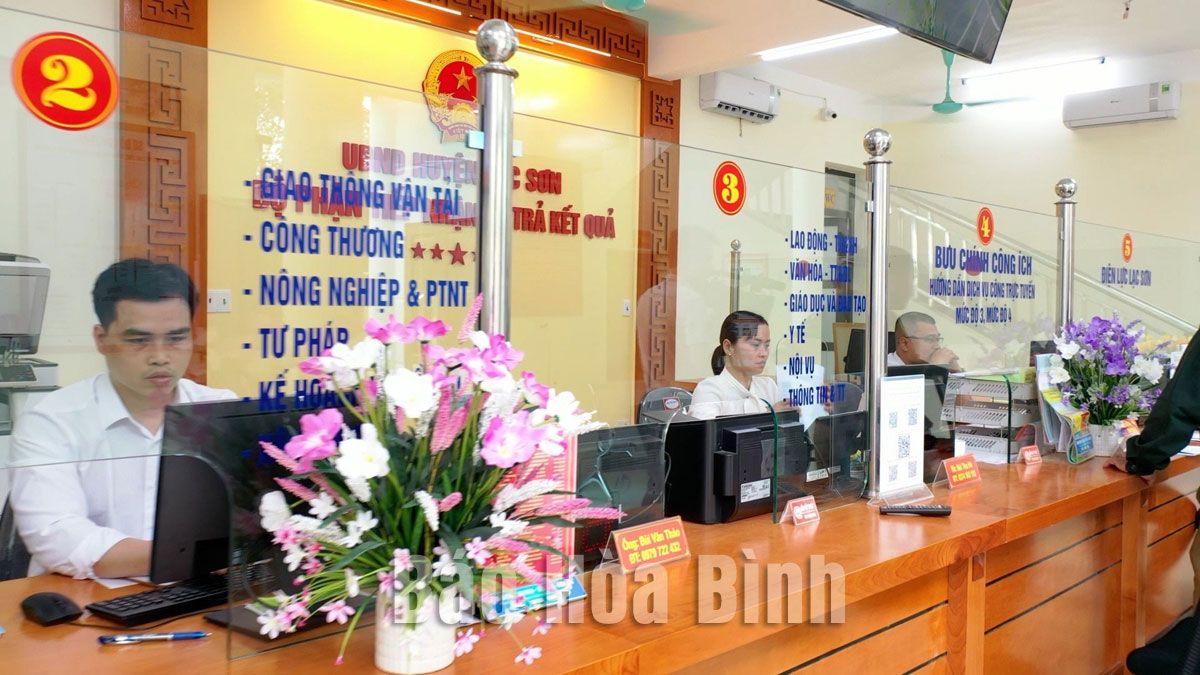
(HBO) – Statistics showed that between January and March, the reception-return unit of Lac Son district, Hoa Binh province, received 3,903 dossiers via the public service portal, of which 2,658 were handled, and it is working on 1,256 others, with no overdue documents.
 Officials of the reception-return unit of Lac Son district have worked hard to fulfill their tasks.
Officials of the reception-return unit of Lac Son district have worked hard to fulfill their tasks.
Chairman of the People's Committee of Lac Son district Bui Van Linh said apart from earmarking over 2 billion VND (85,258 USD) to build a modern "one-stop-shop" model, the district has also focused on directing agencies, units, officials, and public servants to fulfill their duties and tasks with a high sense of responsibility.
Notably, the officials in charge have guided people to conduct administrative procedures on digital platforms, helping create breakthroughs in administrative reforms and e-administration building.
The acceleration of e-administration building not only facilitates the handling of administrative procedures for people and businesses, looking towards a transparent, friendly administrative sector, but also contributes to addressing the present urgent issues.
Currently, the reception-return unit has been set up in all of the 24 communes and towns in the district with modern equipment. Local residents have been guided to submit dossiers, use IT equipment and install the e-identification app (VNEID).
The online payment for such services has also produced good results. The time taken to handle administrative procedures has been reduced by 20-50% through the public service portal in sectors and areas under the district People’s Committee, encouraging people to use the services.
Linh said the enhancement of the friendly e-administration building has contributed to raising the efficiency of State management, reforming work styles, and changing the mindset of State agencies in the locality, while creating consensus and closeness between local authorities and residents.
The work has benefited local residents and helped prevent corruption, harassment, and inconvenience. This is also the foundation for Lac Son to gradually build a digital administration and digital citizens./.
The Standing Board of the Hoa Binh provincial Party Committee has agreed in principle on a proposal by the Standing Board of the Party Committee of Hoa Binh city to gather feedback on the city’s 1:2000 zoning plan, which forms part of its broader urban development strategy.
Hoa Binh province has made notable progress in public administration reform and digital government development, with the satisfaction index among citizens and businesses reaching over 84%, according to recent government evaluations.
Thanks to great efforts by local authorities in recent times, the governance and public administration performance of Mai Chau district has been significantly improved.
In the afternoon of June 6, the Party Committee, the People's Council, the People's Committee and the Fatherland Front of Lac Son district solemnly held a meeting to celebrate the 139th anniversary of the district's founding (1886–2025) and the 79th anniversary of the establishment of the district's Party Committee (1946–2025). There was the attendance of Mr. Bui Van Thang, the Vice Chairman of the Provincial People's Council; Mr. Quach Tat Liem, the Vice Chairman of the Provincial People's Committee; Ms. Dang Bich Ngoc, the Deputy Head of the National Assembly Delegation of the province; as well as the former leaders of the province and district through various periods, who are the natives of the district.
Implementing the Politburo’s Resolution No. 57-NQ/TW on breakthroughs in science – technology, innovation, and digital transformation is a golden opportunity for the northern mountainous province of Hoa Binh to renew growth model, improve competitive edge and shorten digital gap.
Resolution 57-NQ/TW, issued by the Politburo on December 22, 2024, identifies sci-tech, innovation, and digital transformation as strategic breakthroughs to build a developed and prosperous nation. In Hoa Binh province, this spirit is not just a slogan, it’s being put into action through concrete initiatives that form a "new development triangle”: digital citizenship, digital economy, and digital administration.



 Officials of the reception-return unit of Lac Son district have worked hard to fulfill their tasks.
Officials of the reception-return unit of Lac Son district have worked hard to fulfill their tasks.